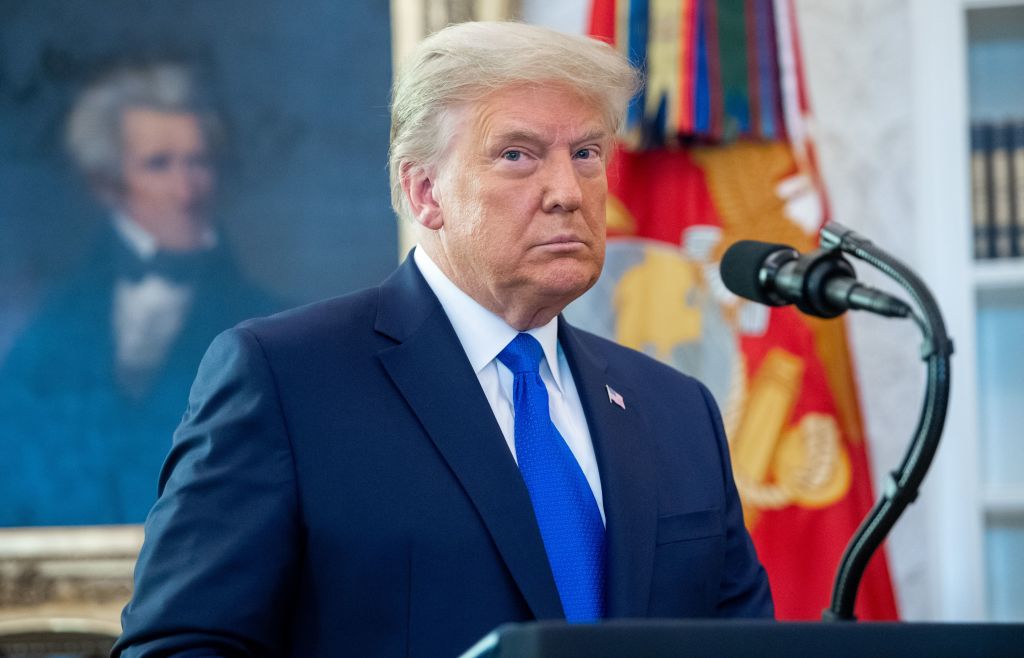Trump reportedly nearly blew up delicate COVID-19 relief talks with demand for $2,000 direct checks


A free daily email with the biggest news stories of the day – and the best features from TheWeek.com
You are now subscribed
Your newsletter sign-up was successful
"Congressional leaders are preparing the second-largest federal rescue package in our nation's history, and no one has seen it just days before it will get a vote," Politico reports. The emerging $900 billion legislation, based on a proposal from a bipartisan group of Senate moderates, is believed to contain $600 direct stimulus payments for many Americans, but "senators are walking around clueless, with no idea what to expect or when to expect it."
Meanwhile, President Trump, who hasn't been directly involved in the negotiations, was ready to step in Thursday with a demand for "substantially larger stimulus payments," The Washington Post reports, and he "was in the middle of formally drafting his demand for the larger payments when White House officials told him that doing so could imperil delicate negotiations over the economic relief package." Trump reportedly told allies Thursday afternoon he wants stimulus checks of "at least" $1,200 per person, but preferably as big as $2,000.
"The aides were really frantic, saying, 'We can't do this. It will blow up negotiations,'" one person who heard the exchange told the Post. Trump has previously publicly supported larger stimulus checks. Treasury Secretary Steven Mnuchin, Trump's main negotiator on COVID-19 legislation, included Trump's name on an earlier round of $1,200 checks.
The Week
Escape your echo chamber. Get the facts behind the news, plus analysis from multiple perspectives.

Sign up for The Week's Free Newsletters
From our morning news briefing to a weekly Good News Newsletter, get the best of The Week delivered directly to your inbox.
From our morning news briefing to a weekly Good News Newsletter, get the best of The Week delivered directly to your inbox.
The $600 checks are in the legislation largely due to an intervention by Sen. Bernie Sanders (I-V.t) and Sen. Josh Hawley (R-Mo.). Senate Majority Leader Mitch McConnell (R-Ky.) did not include any such payments in his sparser proposals, and many Senate Republicans are insisting the legislation come in at under $1 trillion; stimulus checks larger than $600 would push the price tag above that mark. Democrats and the White House were in agreement on a package worth about $2 trillion before the election, but Senate Republicans balked.
A free daily email with the biggest news stories of the day – and the best features from TheWeek.com
Peter has worked as a news and culture writer and editor at The Week since the site's launch in 2008. He covers politics, world affairs, religion and cultural currents. His journalism career began as a copy editor at a financial newswire and has included editorial positions at The New York Times Magazine, Facts on File, and Oregon State University.
-
 Key Bangladesh election returns old guard to power
Key Bangladesh election returns old guard to powerSpeed Read The Bangladesh Nationalist Party claimed a decisive victory
-
 Judge blocks Hegseth from punishing Kelly over video
Judge blocks Hegseth from punishing Kelly over videoSpeed Read Defense Secretary Pete Hegseth pushed for the senator to be demoted over a video in which he reminds military officials they should refuse illegal orders
-
 Trump’s EPA kills legal basis for federal climate policy
Trump’s EPA kills legal basis for federal climate policySpeed Read The government’s authority to regulate several planet-warming pollutants has been repealed
-
 TikTok secures deal to remain in US
TikTok secures deal to remain in USSpeed Read ByteDance will form a US version of the popular video-sharing platform
-
 Unemployment rate ticks up amid fall job losses
Unemployment rate ticks up amid fall job lossesSpeed Read Data released by the Commerce Department indicates ‘one of the weakest American labor markets in years’
-
 US mints final penny after 232-year run
US mints final penny after 232-year runSpeed Read Production of the one-cent coin has ended
-
 Warner Bros. explores sale amid Paramount bids
Warner Bros. explores sale amid Paramount bidsSpeed Read The media giant, home to HBO and DC Studios, has received interest from multiple buying parties
-
 Gold tops $4K per ounce, signaling financial unease
Gold tops $4K per ounce, signaling financial uneaseSpeed Read Investors are worried about President Donald Trump’s trade war
-
 Electronic Arts to go private in record $55B deal
Electronic Arts to go private in record $55B dealspeed read The video game giant is behind ‘The Sims’ and ‘Madden NFL’
-
 New York court tosses Trump's $500M fraud fine
New York court tosses Trump's $500M fraud fineSpeed Read A divided appeals court threw out a hefty penalty against President Trump for fraudulently inflating his wealth
-
 Trump said to seek government stake in Intel
Trump said to seek government stake in IntelSpeed Read The president and Intel CEO Lip-Bu Tan reportedly discussed the proposal at a recent meeting
